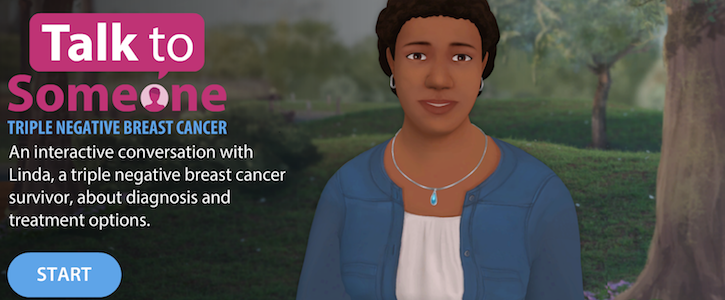How Virtual Coaches Change the Conversation for Cancer Patients
The CDC thinks artificial intelligence can persuade people with breast cancer to pursue chemotherapy.

The problem is clear, but it might require a groundbreaking solution.
About 10-20% of breast cancers are triple-negative (TNBC), meaning the cancer cells have tested negative for estrogen receptors, progesterone receptors, and HER2. These patients do not respond to hormonal therapy or therapies that target HER2 receptors, according to research. And the 5-year survival rate of women with TNBC is 77%, compared to 93% for women with other forms of breast cancer. For the best chance of survival, the CDC recommends chemotherapy.
But many women with TNBC don’t opt to pursue chemotherapy. It was in looking for ways to solve this problem that Lisa Richardson, MD, director of the CDC’s Division of Cancer Prevention and Control, learned of the New York City tech company Kognito—and an innovative opportunity.
Kognito describes itself as “a health simulation company that believes in the power of conversation to change lives.” It develops “virtual coaches,” a type of artificial intelligence, to help people have difficult conversations, particularly in healthcare.
The company launched a pilot program surrounding its virtual coach for women with TNBC, Linda, this November at an Atlanta hospital. The CDC is funding the effort, while the nonprofit National Association of Chronic Disease Directors is managing it. They’re examining how the tool might motivate patients to pursue chemo.
Stakeholders expect the pilot to end early next year, and if the data show what Kognito and the CDC hope they will, the program will then be made public, free of charge, to hospitals across the country.
Linda’s job is not to replace doctor-patient interaction, but rather to supplement it after in-person visits. Once a doctor has met with a patient to deliver a diagnosis and answer any questions about treatment options and next steps, the provider can tell the patient about Linda, which the patient may access any time through a computer or smartphone.
For this pilot, Linda’s purpose is “to engage in a conversation to help patients learn about their condition, and to build intrinsic motivation to pursue a particular treatment option that the CDC highly recommends,” says Ron Goldman, Kognito CEO and co-founder.
“Linda is fully animated, she was coded with a personality, and she talks to patients. She asks them questions, and they can ask her questions. Based on the questions a patient asks and the answers they communicate, she will tailor the messaging and the content she provides,” says Goldman. “At the end of the day, what she’s trying to do is make sure that each patient walks away knowing what they need to know, to help these women to consider chemotherapy as a treatment option.”
Upon completion of the pilot program, the data will show whether patients who interact with Linda opt for chemotherapy more often than those who do not.
The Power of Virtual Connections
What is it that makes Kognito and the CDC think that Linda will have luck guiding patients to the best treatment options, when their doctors might not? “Current education is often self-directed. Patients will go to the CDC website or do a Google search. There are a lot of PDFs to read, a lot of research articles, and a lot of written information,” says Goldman. “It’s not easy for everyone to digest at different levels of education, and in many cases, it’s not presented in an empathetic tone. You’re requiring people who are overwhelmed with a new diagnosis to sit and read through a lot of information.”
In addition to the fact that Linda can speak to any level of understanding and education, she is always on call, which takes some pressure off physicians, who must limit time spent per appointment to see all of their patients. “This certainly can help with patient outcomes, but it also helps the healthcare provider, because it’s like they now have an assistant who can help with some of the responsibility and help augment that relationship,” Goldman says.
Finally, he adds, people are often more likely to open up to a virtual coach about difficult topics than in a face-to-face conversation with a person. “Many studies show that we are much more willing to share, to receive feedback, and to be educated from a virtual human than we are from real people,” he says. “So, when you’re talking about very sensitive topics like cancer, virtual humans actually have a leg up over us. If you can get more information out of a patient, that is sincerer and leads to better treatments. That’s a remarkable impact.”
Impact Across the Industry
Kognito’s technology is not just for breast cancer patients. The 13-year-old company started with a module where physicians could roleplay with virtual patients to improve physicians’ confidence and social skills in difficult conversations, as a training tool before engaging with real patients.
The Kognito team includes more than 55 people, including psychologists, game designers, writers, and software engineers. It is the only company in the US with a health simulation listed in the Substance Abuse and Mental Health Services Administration’s National Registry of Evidence-Based Programs and Practices.
“We can all agree that conversations are very powerful tools to educate, motivate, inform, and to drive positive behavior change,” Goldman says. “In health, conversations are very critical; they can have a tremendous positive or negative impact.”
Indeed, Kognito’s technology has the potential to affect many areas of physical and mental health. It’s being used on college campuses to help educate faculty, staff, and students to “create an environment supportive of LGBTQ students,” and to teach military families how to talk with their returned veteran family members “about improving family cohesion, employment, and if necessary, the need to seek professional help.”